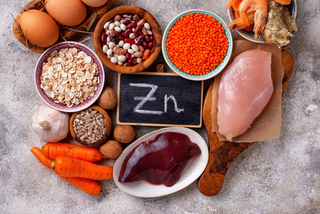If I asked you what is zinc, and why you would take zinc, what would you think of? Would you think of the immune impact? The antioxidant properties? Or maybe you might be thinking about its place on the periodic table. Although these things are all aspects of zinc, do you know the full story when it comes to zinc?
What is Zinc?
Zinc is a trace mineral and essential micronutrient. We consider zinc essential because we cannot synthesize it on our own, and we need to consume it daily.
Zinc helps your immune system and metabolism function. Zinc is also important to wound healing and your sense of taste and smell. Additional benefits include: balancing blood sugar and insulin, and contributing to overall heart health in relation to blood pressure and cholesterol.
There are various forms of zinc, and figuring out which one to use can be a challenge at times.
Here are a few types you might find on the market:
- Zinc gluconate: As one of the most common over the counter forms, zinc gluconate is often used in cold remedies like lozenges and nasal sprays.
- Zinc acetate: Like zinc gluconate, zinc acetate is often added to cold lozenges to reduce symptoms and speed up recovery.
- Zinc sulfate: In addition to helping prevent zinc deficiency, zinc sulfate has been shown to reduce the severity of acne.
- Zinc picolinate: According to some studies, your body may absorb this form better than other types of zinc, including zinc gluconate and zinc citrate.
- Zinc orotate: This form is bound to a compound known as orotic acid. It’s one of the most common types of zinc supplements on the market.
- Zinc citrate: One study showed that this type of supplement is as well absorbed as zinc gluconate but has a less bitter, more appealing taste.
- Zinc bysglycinate: Similar to zinc picolinate, is more easily absorbed by the body. Most sources suggest that this form is the most readily absorbed.
Food Sources of Zinc
Zinc can be found in both animal and plant sources. Animal sources tend to be the richest: meats, seafood and dairy. Plant sources include: nuts, seeds, beans, whole grains, and fortified cereals. Generally the zinc in animal sources is more readily absorbed than the plant based because the large quantity of phytates present in plant sources.
Zinc Deficiency
Due to the lower bioavailability of plant based zinc, deficiency can be a particular issue for vegetarians and vegans. To prevent zinc deficiency, women need at least 8 mg of zinc daily (that need increases to 11 mg during pregnancy and 12 mg when breastfeeding), while men require at least 11 mg of zinc each day. That's a minimum requirement. For optimal health and targeted support (think immunity), zinc needs are thought to be even higher (15 to 30 mg).
Who Should Take Zinc?
Zinc supplements are generally well tolerated, though they’ve been associated with adverse side effects like nausea, vomiting, diarrhea, and stomach pain in some people. Exceeding 40 mg per day of elemental zinc can cause flu-like symptoms like fever, coughing, headache, and fatigue. Zinc can also hinder your body’s ability to absorb copper, potentially leading to a deficiency in this key mineral over time. Furthermore, zinc supplements have been shown to interfere with the absorption of certain antibiotics, reducing their effectiveness if taken at the same time. To reduce your risk of side effects, stick to the recommended dosage and avoid exceeding the tolerable upper limit of 40 mg per day, unless specifically prescribed by your medical professional.

